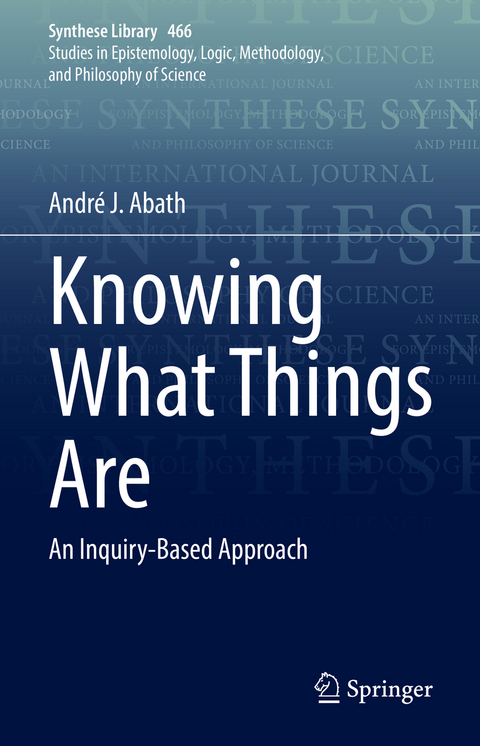
Knowing What Things Are
Springer International Publishing (Verlag)
978-3-031-07364-9 (ISBN)
This book provides an account of what is to know what things are, focusing on kinds, both natural (such as water) and social (such as marriage). It brings tools from an area that has received much attention in recent years, the epistemology of inquiry. The knowledge of what things are is to be understood as resulting from successful inquiries directed at questions of the form 'What is x?', where x stands for a given kind of thing. The book also addresses knowledge-wh in general (which includes knowledge-who and knowledge-where), as well as the phenomenon of ignorance regarding what things are and our obligations in respect to knowing what things are. It also brings to light new avenues of research for those interested in the relation between the knowledge of what things are and concept possession and amelioration.
'Knowing What Things Are' should be of interest to researchers in Epistemology, Philosophy of Language,Metaphysics, Philosophy of Mind, Social Philosophy and Linguistics.
Andre J. Abath (PhD Sheffield) is Professor of Philosophy at the Federal University of Minas Gerais (UFMG), in Brazil. His teaching and research engage the fields of philosophy of mind, language and epistemology.
1. Introduction.- Part I. Toward the Erotetic View. 2. The Knowledge of What Things Are: Possible Views.- 3. Questions and Answers: Understanding Knowledge-Wh.- 4. The Erotetic View.- Part II. Developing the Erotetic View. 5. The Gradability of the Knowledge of What Things Are.- 6. Social Kinds, the Erotetic View and Erotetic Amelioration.- 7. The Knowledge of What Things Are: Ignorance and Obligations.- Appendix A. Having Concepts and Knowing What Things Are.- Appendix B. Incomplete Understanding of Concepts and the Gradability of the Knowledge of What Things Are.- Appendix C. The Knowledge of What Particular Things Are.
| Erscheinungsdatum | 10.08.2022 |
|---|---|
| Reihe/Serie | Synthese Library |
| Zusatzinfo | X, 138 p. 1 illus. |
| Verlagsort | Cham |
| Sprache | englisch |
| Maße | 155 x 235 mm |
| Gewicht | 379 g |
| Themenwelt | Geisteswissenschaften ► Philosophie ► Allgemeines / Lexika |
| Geisteswissenschaften ► Philosophie ► Erkenntnistheorie / Wissenschaftstheorie | |
| Geisteswissenschaften ► Psychologie ► Allgemeine Psychologie | |
| Geisteswissenschaften ► Psychologie ► Verhaltenstherapie | |
| Geisteswissenschaften ► Sprach- / Literaturwissenschaft ► Sprachwissenschaft | |
| Schlagworte | Amelioration • Attributions Knowledge Concepts • Attributions knowledge pragmatism • Burge Concepts • Burge Deference • Burge Possession Conditions Concepts • Concepts • Conceptual Engineering • ConText • contextualism • Criticism Peacocke Concepts • epistemic view of concept attribution • ignorance • Inquiry • intellectual account knowledge • Knowledge • Knowledge of things • Knowledge-wh • Knowledge what • literature on attributions of knowledge • non-intellectual account knowledge • obligations • Peacocke Concepts • pragmatic account context sensitivity • questions • Ryle Glick • Sensitivity attributions knowledge • Stanley Williamson • theories concepts • Travis Fodor Concept • Understanding Knowledge concepts |
| ISBN-10 | 3-031-07364-9 / 3031073649 |
| ISBN-13 | 978-3-031-07364-9 / 9783031073649 |
| Zustand | Neuware |
| Informationen gemäß Produktsicherheitsverordnung (GPSR) | |
| Haben Sie eine Frage zum Produkt? |
aus dem Bereich


